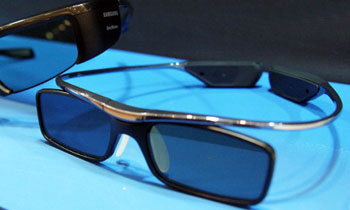CEA may be trying to standardise the infrared (IR) protocol used in active-shutter (AS) 3D glasses so that they are cross-compatible between different 3DTV brands, but Samsung is already moving on to what it thinks is a superior method to maintain synchronisation between eyewear and transmitter. The Korean HDTV manufacturer has launched its 2011 range of active-shutter 3D glasses, which uses Bluetooth instead of infrared technology.

By using Bluetooth signals to sync with the built-in transmitter embedded on the 3D TV, Samsung’s new AS 3D glasses does not require line of sight to work in tandem with the television, allowing users more freedom to move around (although they will still have to sit within the recommended viewing range and angles for optimal 3D effects). From our experience and anecdotal accounts from others, conventional infrared 3D glasses can occasionally lose sync either due to physical obstructions, overly strong ambient lighting, or interference with other IR devices.
In fact, some retailers have reported issues with active 3D TVs from different makes placed in proximity of each other on the shop floor, contributing to less-than-satisfactory demonstrations. If the active 3D glasses are not synced correctly with the three-dimensional sets, then viewers may witness more flicker or blurriness when watching 3D content, ultimately spoiling the viewing experience.
Four models of the new Bluetooth 3D glasses have been released: the SSG-3700CR uber-stylish one designed with the help of Silhouette; the SSG-3300GR rechargeable version; the SSG-3100GR battery-operated variant; and the SSG-3300CR compact rechargeable type (suitable for children). Unfortunately, these Bluetooth-enabled glasses are only compatible with Samsung’s 2011 3D HDTVs such as the D7000 and D8000, but not with last year’s models that are equipped with infrared transmitter.
Popular video game consoles like the Sony Playstation 3 (PS3) and Nintendo Wii already employ Bluetooth technology to deliver a secure and efficient connection between console and controllers. With the launch of its Bluetooth active-shutter 3D glasses, Samsung have certainly opened up the possibilities in the home entertainment (or more specifically, 3D accessories) market.